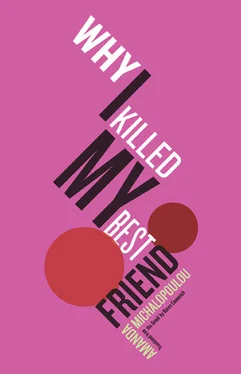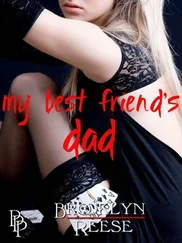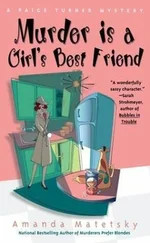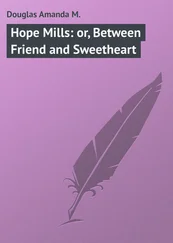In the wake of this tragic event, the protestors dispersed. The demolition of the remaining homes will commence tomorrow morning. Apart from the buildings themselves, workers are now faced with the piles of trash left by “environmentalist” protestors, who fought for a better tomorrow with beer cans and paper bags. .
Bela Psaraki
The Afternoon Post
•
A FAREWELL TO ANNA
Who was Anna Horn? An everyday saint whose name was unknown until yesterday? An incurable romantic who fought for a better tomorrow? Over the past few days we’ve seen her on the news, infinitely repeating the only statement of hers which — to their great luck — television crews had recorded, so that they are now able to give a face to the name of the woman murdered in cold blood by a policeman’s bullet. “We all have to show courage and faith in our ideals,” she said. “We have to literally embody our emotions if we’re going to act politically. New technologies have marginalized the body. There’s nothing more dangerous than that. We here are going to fight with our bodies, because it’s the only thing we have left.”
And Anna Horn did in fact fight with her body. Beautiful militant, mother and intellectual, her multifaceted image has already been so thoroughly circulated as to end up a stereotype. Old photographs from her days as an art student in Paris, statements from friends and acquaintances, even some of her father’s writings about the anarchist movement in Europe have been deployed. But what lesson can we learn from Anna? What did she leave behind, apart from a young daughter and an adoring husband?
What Anna Horn left behind is a deep distrust of the Greek police, and by extension of the entire state apparatus — a state apparatus that once again reacted to tragedy in a way that can only leave us speechless. A press release by the Minister of Public Order reads, “We must learn from this mistake. It is in our best interest as a nation not to dwell on a single event, but to consider and assess the overall effort.” This “overall effort” apparently refers to the muzzling of thousands of protestors (roughly 2,500 were present on the night of the shooting) who had come to express their anger and bitterness at the way the state machine is organized, at the passivity of political life. To express, too, their nostalgia for a way of life they are being asked to abandon in order to make way for the forces of progress and prosperity signaled by the grand Olympic building projects.
What else did Anna teach us? That we still have bodies, which we can use as political tools. That an overexposure to mass media achieves precisely the opposite of bodily political action: we watch instead of taking part. That the ideology of the lone revolutionary no longer applies, that there isn’t just one form of revolutionary thought. Beneath their kerchiefs, behind their names, the young (and not-so-young) demonstrators on the Attic Highway taught us the postmodern political language of the masses, taught us to accept states of contradiction, taught us that the era of solitary leaders is over. No more tidy marches organized by trade unions, no more dogma, no more replacing of one power structure with another that’s even worse. The biggest challenge faced by anti-globalization movements is an internal one: if the reformist left prevails at the expense of these grassroot, anti-establishment trends, then we’ll simply continue to breed cosseted unionists with no real impulse to fight the reigning institutional framework of representative “democracy.” In which case every radical attempt at regeneration will fail. All that will remain in a hierarchy of this sort will be the leisurely demonstrations of the middle class (who have money to travel to the places where World Bank summits are held) and the occasional quaint little article in the daily paper. .
Something else that Anna taught us: that the act of occupying the street at this particular historical moment is the end result of multiple processes — and while rapt art historians and theorists have noted the theatrical value of this act over the past several days, it also has a certain pragmatic value, which lies in the (albeit temporary) disruption of the work crews, and in the difficulties created for the system, if only for a few days.
If we all become romantic troublemakers, Anna Horn won’t have to feel alone.
From an op-ed by Despina Arvaniti
The Free Press
•
THE REAL REVOLUTIONS OF ANNA HORN
I’ve known Anna Horn since we were kids. We used to play together during recess. What times those were! Dressed in school uniforms, we swapped hair clips and zodiac crackers. It was 1977. No one could resist the charm of our new classmate who arrived from Paris and spoke to us with such aplomb about the Café de Flore and real butter croissants. Petros Misiakos, today the director of a major software company, wanted to marry her. Maria Papamavrou, whose installations have in the past decade breathed new political life into the art world, was content to live in her shadow. And me? Anna taught me lessons of radical elegance — I begged my mother to buy me tortoiseshell barrettes, which in those days you could only find in major European cities.
The newspapers are calling Anna a great revolutionary, which in my opinion is a distortion of her personality. Anna was a cheerful aesthete who knew how to make you feel she was a rare diamond, even in jeans. Our paths crossed twice in the past year: once at a reception at the prime minister’s residence, and once at a charity fashion show. And no, Anna Horn didn’t breathe a word about politics. She was a radiant bohemian, looking for a French-speaking governess for her adorable little girl. I’m sure she went to the Attic Highway as enthusiastically as she came to these charity events, moved by her desire to give back. I’ll always remember her as a lively woman who knew how to have fun, who would grab her husband, Aristomenis Malouhos, by the arm, to fight with him side by side in the only real trenches we have left: the trenches we dig in the struggle against gloom and doom.
In this issue you’ll find the best of the military look that will dominate the catwalks this winter. My recommendation? Don’t give up the fight for the masterful Christian Lacroix backpack. Long live the revolution!
Editor’s note, Geli Kotaki
Vogue Greece
•
ALONE AT HOME, EATING BLACKBERRIES AND BREAD
Night falls;
it’s nice to feel you’re missing nothing by staying in
— the river, the mountain, the city that calls to you.
You turn inward, curl up on your inner branch;
outside it’s at least as dark as in.
A woman walks through the apartment upstairs,
a man nails something to the wall you share.
Night falls — a little bread to help the berries go down.
Yes, they nail into you, walk over you,
you can trust yourself to strangers’ hands.
Door locked, alone, blackberries and black bread.
You eat and are eaten, watch and are watched.
You unfold what you are and take a good look.
Day breaks again, objects harden into shapes.
The tree is a tree, the bread bread, and the berries
small and moldy at the edge of the plate.
The woman left for work,
the man surely has a seascape, now,
in his living room.
Naked and repellant, those inner branches,
and the day calls to you again.
Anna Horn
Paris, April 1981
•
ADIDAS CLASSICS
On the way home from my evening walk I passed by your house.
Lights on, windows open
and the sound of your life from the attic room
— a chair being dragged
a woman’s laugh
Читать дальше












